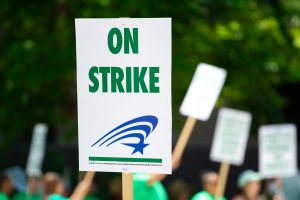Mallory Harrington on July 30, 2024
- In her forthcoming book, Stolen Pride: Loss, Shame, and the Rise of the Right, Arlie Russell Hochschild (Professor Emerita of Sociology at the University of California, Berkeley) interviews residents of Pikeville, KY, a small city located in the whitest and second-poorest U.S. congressional district where 80% of 2016 voters supported Donald Trump. Hochschild finds a pervasive sense of loss. “There’s a regional story, and that’s that coal jobs are out. They have blamed the liberal war on coal for that loss. Opiate addiction has come in big time and hasn’t stopped,” Hochschild told Democracy Now. “And now many are leaving the region, the young, the most educated. And so, this becomes an area of loss.” Hochschild describes how economic loss can spark shame and describes Donald Trump as the ‘shame president’: “He comes in with an anti-shaming ritual that relieves them of this. And I think that’s a lot of the steam behind the MAGA enthusiasts for the Republican ticket.”
- On July 13th, former President Donald Trump survived an attempted assassination at a campaign rally in Butler, PA. Katherine Stewart (author and journalist) and Samuel Perry (Professor of Sociology at the University of Oklahoma) appeared on Vanity Fair’s Inside the Hive podcast to discuss the political impact of Christian Nationalism and how the assassination attempt may reinforce Trump’s messiah-like image among followers. “Everybody’s saying it’s providence, he was saved by God,” Stewart said. “A sector of the movement has, frankly, consistently framed the contemporary political landscape as being one of spiritual warfare.” Perry added that the Republican Party has powerfully harnessed religion as a uniting message and that Democrats need to define a shared value system: “‘What unites us as a people?’ Well, in their mind, it’s this Christian heritage and ethnic culture that they adhere to. But for the rest of Americans, what does unite us?”
- Callum Cant (Postdoctoral Researcher at the University of Oxford) wrote an opinion piece for The Guardian on the narrow defeat for union recognition for Amazon employees in the U.K. Following a wave of strikes in U.K. warehouses in 2022, Cant describes that Amazon “had to use every trick in its extensive union-busting playbook to secure the result.” Cant argues that Amazon’s razor-thin victory indicates that global efforts for union recognition are at a tipping point and, under harsh economic conditions, “workers may find that they have no other choice but to get organized.”
- Chua Beng Huat’s (Professor Emeritus of Sociology and Anthropology at the National University of Singapore) recent book, Public Subsidy / Private Accumulation: the Political Economy of Singapore’s Public Housing, offers an analysis of housing in Singapore and the increasingly visible problems with Housing Board flats. Huat argues that the government faces a delicate balancing act between curbing runaway housing prices that are preventing young, first-time buyers from buying their first flat and maintaining the value of homes as a primary asset for older owners. Huat also notes that buy-sell-repurchase cycles of Housing Board (HDB) flats may contribute to inequalities: “The younger generation is more calculative about making a profit from HDB, but in practice, only those with higher income among the residents are able to upgrade.” This story was covered by The Straits Times.





Comments 9
Second-Hand Furniture — August 13, 2024
Discover Second Hand Furnitures that tell a story. Our collection includes items with character and history, adding depth to your home decor while being kind to your wallet.
marykayintouch.com login — August 15, 2024
Thank you for sharing this exceptional information; it is greatly appreciated. Not only are your journals very informative and easy to read, but they are also quite humorous.
marykayintouch.com login — August 15, 2024
Thank you for sharing this exceptional information; it is greatly appreciated. marykayintouch.com login
Mywwu De — August 31, 2024
Falls Sie sich über die Registrierung auf münster informieren möchten, gehören Sie vermutlich zur WWU Münster. Hier haben Sie Zugang zu allen relevanten Informationen und Anleitungen.
Cornelius — September 20, 2024
Hi! After reading a few of the postings, I realized that I had never been to this website before, even though I could have sworn that I had been there before. On the other hand, I can't express how happy I am that I discovered cookie clicker in and make sure to check back!
Mypascoconnect — September 25, 2024
Hello Thanks for this info.
publixpassport — September 26, 2024
Fantastic post here ! really very knowledgeable !
Jack Jokky — September 26, 2024
It's Incredible ! Publix Passport
HARLY — November 26, 2025
This was a thoughtful read. It’s interesting how each section highlights a different kind of social or economic pressure shaping people’s beliefs and decisions. The themes of loss, identity, and uncertainty really stand out, especially when you look at how communities respond to change. I’ve been exploring similar topics recently, and this site has also been helpful for broader context.https://publixpassportaccess.us/